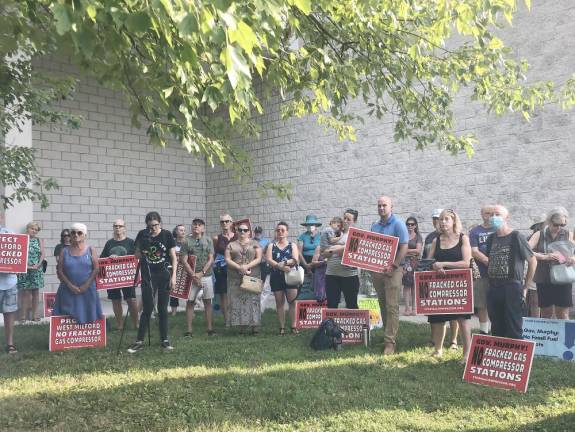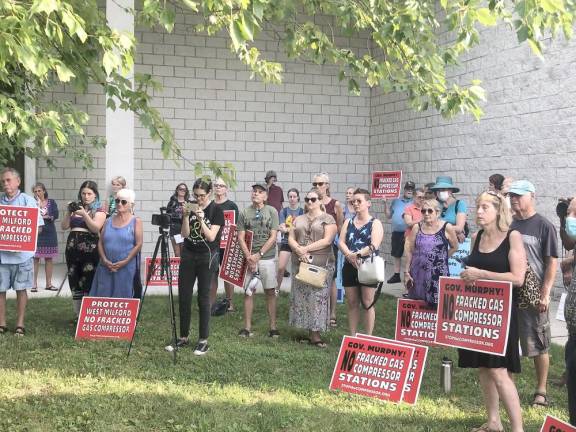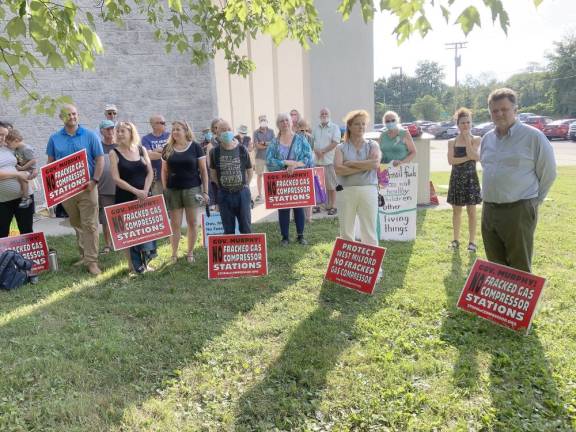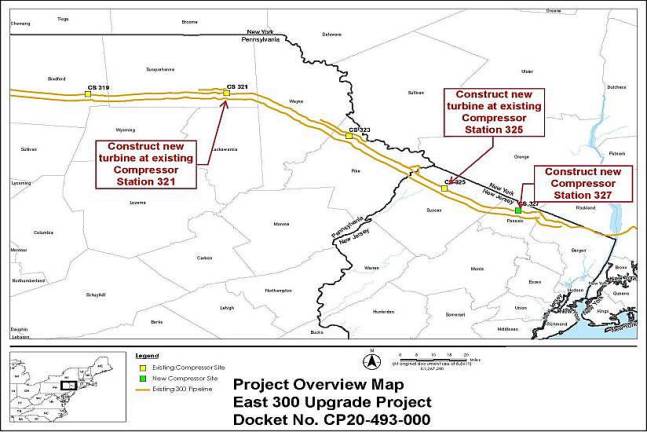Residents rally against gas compressor expansion project
WEST MILFORD. The Tennessee Gas Pipeline is looking to add a compressor station to West Milford.




On August 4, the NJ Department of Environmental Protection (NJDEP) held a public hearing at Sussex County Technical School in Sparta regarding the proposal to expand and build gas compressor stations along the northern NJ portion of the Tennessee Gas Pipeline (TGP) Company’s ongoing project. The NJDEP sought public comment on its intent to approve an air pollution control Operating Permit Renewal for TGP.
State regulations require existing facilities “with a potential to emit major amounts of air contaminants” to obtain an operating permit that details the air pollution control requirements for their facility, as well as the maximum amount of air pollutants that can be emitted.
The public comment period was necessary because, as noted by the NJDEP, “All persons, including the applicant, who believe that any condition of the draft Air Pollution Operating Permit or the Department’s tentative decision to approve this permit is inappropriate, must raise all reasonable issues of concern and submit all arguments and factual grounds or materials supporting their position during the public comment period.” The public comment period ended on August 8.
Pipeline expansion
The existing local facility is TGP Compressor Station 325 in Wantage at 164 Libertyville Road. TGP is looking to construct a new turbine at the existing compressor station and expand the operation to construct a new compressor station (Compressor Station 327) in West Milford on Burnt Meadows Road near the Monksville Reservoir.
In 2021, TGP said that the expansion was necessary to meet the market need of its shipper, Consolidated Edison Company of New York.
In February 2021, the TGP’s expansion plans were laid out in a report by the Federal Energy Regulatory Commission, called “East 300 Upgrade Project.” The report gathered questions and comments from several area organizations and municipalities, including the Township of West Milford and Sustainable West Milford. The report concluded that CS 327 “has negligible potential to contribute to cumulative air impacts when combined with any other emission sources, including metering stations in West Milford and Bergen County.” It also noted that no “state-designated Public Community Well Head Protection Areas” will be crossed by the project, no drinking wells have been found within 150 feet of it, and no impact from contaminated soil is anticipated.
“Should unanticipated contaminated soils be encountered during construction, Tennessee would evaluate and treat impacted groundwater in accordance with its Plan for Unanticipated Discovery of Contaminated Soils or Groundwater and applicable federal and state requirements,” the report stated.
However, accidents have been known to happen. A portion of the pipeline in Clermont, Pennsylvania, reportedly exploded in July, causing a large wildfire, according to the local news outlet The Bradford Era. About a decade ago, maintenance and additional construction of the pipeline in NJ caused a sinkhole and mudslide into the former Lake Lookover in West Milford, impacting drinking water in that area.
Opposition continues
At last week’s public hearing, dozens of North Jersey residents and activists rallied in opposition of the expansion, and associated air quality permit renewal.
“Our government is supposed to protect the people and the common good, not major corporations like the oil and gas industry,” said Renee Allessio, a 45-year resident of West Milford and board member of Sustainable West Milford. “Fossil fuel extraction, transportation, and combustion pollute the air communities breathe, the water they drink, the land they walk on, and the food they eat. The release of these pollutants is also a major cause of climate change.”
According to the report noted above, CS 327 is expected to emit volatile organic compounds, nitrogen oxide, sulfur dioxide, carbon monoxide, and other chemicals. The report estimated those emission to be “negligible,” adding that the project would “not cause or significantly contribute to a degradation of ambient air quality.”
However, a resident near the Wantage compressor described a different experience.
“My family moved to Wantage to build our forever home not knowing the major risks this facility would pose to our growing family. We already deal with the awful smells from the facility and noises 24x7. On January 1 of this year, a blowdown as loud as a jet engine released a toxic plume that engulfed the local community and could be smelt, for miles,” said Kelly Kessler, a Wantage resident who lives less than a mile from the existing facility. “These facilities release benzene a known source of childhood leukemia. An even bigger facility three times this size is not safe to raise children around.”
Those in favor of the pipeline see it as a way for the US to move toward energy independence. In response to a letter to the editor, written by Allessio about a month ago, one commenter who went by the name Dave Smith said, “Everyone recognizes that fossil fuels create long-term environmental problems; however, natural gas is the cleanest and most abundant fossil fuel available until such time as technology replaces all fossil fuels. Wake up, the transition will not happen in our lifetime. We need to utilize natural gas as the primary fuel to heat our homes, generate electricity and keep industry humming. Natural gas is the best alternative to burning oil, coal and wood. Opposition to the compresser (sic) station is stupid. Projects like this are installed all over the country and are highly regulated and monitored for safety. Whatever problems that have occurred due to pipeline construction are minuscule compared to the environmental due [to] the consumption of liquid oil and coal.”
But then there’s the fact that gas pipelines are often meant to send the fuel to other parts of the country and world as part of the broader energy market, and not necessarily to our local markets.
“We seem to lose focus on the fact that none of this gas is intended for use by residents of New Jersey — it’s all going to New York to serve potential new users in the future. It’s not needed, yet the damage will be borne in the Highlands by our residents,” said Julia Somers, executive director of the New Jersey Highlands Coalition. “It’s an outrageous, irresponsible situation! The DEP must deny the permit.”
The NJDEP is in the process of weighing all comments submitted by the aforementioned deadline. A decision date has not been announced.
“Our government is supposed to protect the people and the common good, not major corporations like the oil and gas industry,” said Renee Allessio, a 45-year resident of West Milford and board member of Sustainable West Milford. “Fossil fuel extraction, transportation, and combustion pollute the air communities breathe, the water they drink, the land they walk on, and the food they eat. The release of these pollutants is also a major cause of climate change.”